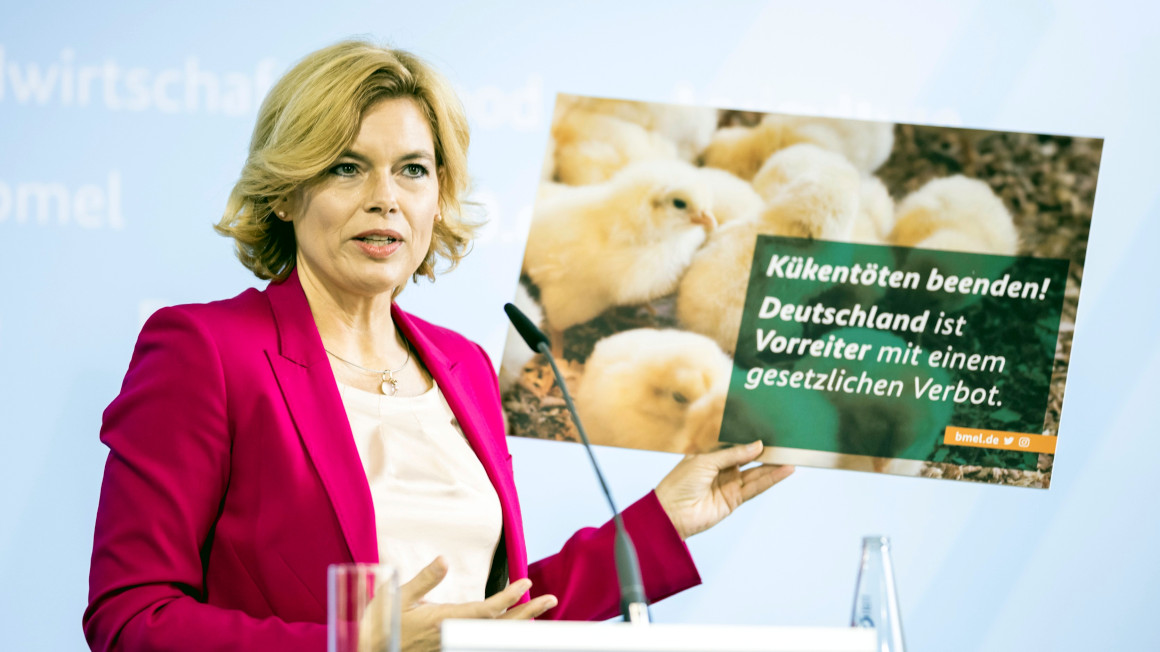Ban on killing chicks is coming
The Federal Minister of Food and Agriculture, Julia Klöckner, wants to ban the killing of male day-old chicks across Germany from the end of 2021. The cabinet passed a corresponding draft law by the Federal Minister today. This puts an end to the common practice in laying hen production that male chicks are killed shortly after hatching because rearing them is not economically viable.
Julia Kloeckner: "With my law, I will ensure that in Germany only eggs are produced without killing chicks. This unethical practice will then be a thing of the past. This is significant progress for animal welfare: we are the first in the world to take such clear action."
In addition to the rearing of brother roosters and the use of dual-purpose chickens, the farms have market-ready alternatives for sex determination in the hatching egg. These procedures were funded by the Federal Ministry with several million euros. They are currently working in a period from the 9th to the 14th day of incubation. A chick is incubated for a total of 21 days. However, research is currently being continued, and the existing processes are to be used and further developed as a bridging technology. Because in a second step, after December 31, 2023, the law will ban the killing of chicken embryos in the egg after the 6th day of incubation. This is a further improvement in animal welfare.
Julia Kloeckner: "By promoting alternatives with millions, we are bringing animal welfare and profitability together on German soil. We offer companies a concrete solution to prevent migration and thus outsourcing of this animal welfare issue. We want to set the pace and set an example for other countries as well I expect retailers to follow up their announcements with specific actions and change their product range accordingly."

Background to sex determination in the egg
The purpose of in-egg sexing is to determine the sex of chicks from laying lines before hatching. And not hatching the male chicks in the first place. Market-ready process that emerged from the research funding of the BMEL. The so-called "endocrinological procedure" is used in practice in some companies. The eggs are incubated for about nine days. Then some liquid is extracted from each egg without touching the inside of the egg, i.e. the embryo. The sex of these samples is determined within a short time using a biotechnological detection method.
The purpose of in-egg sexing is to determine the sex of chicks from laying lines before hatching. And not hatching the male chicks in the first place. Market-ready process that emerged from the research funding of the BMEL. The so-called "endocrinological procedure" is used in practice in some companies. The eggs are incubated for about nine days. Then some liquid is extracted from each egg without touching the inside of the egg, i.e. the embryo. The sex of these samples is determined within a short time using a biotechnological detection method.
Other alternatives:
In addition to the above, the Federal Ministry has also promoted the research and development of other approaches, such as the keeping of so-called "dual-purpose chickens". In the "dual purpose chicken" approach, the hens are used for egg production and the roosters are fattened. Hens of these breeds lay fewer and sometimes smaller eggs than conventional laying hens. In addition, roosters from dual-purpose breeds grow more slowly and have a smaller pectoral muscle than conventional broilers. For these reasons, among others, this alternative has not yet established itself on the market. In a joint project funded by the BMEL, the Federal Ministry has therefore examined various aspects of keeping dual-purpose chickens together with scientific institutions and commercial companies.
In addition to the above, the Federal Ministry has also promoted the research and development of other approaches, such as the keeping of so-called "dual-purpose chickens". In the "dual purpose chicken" approach, the hens are used for egg production and the roosters are fattened. Hens of these breeds lay fewer and sometimes smaller eggs than conventional laying hens. In addition, roosters from dual-purpose breeds grow more slowly and have a smaller pectoral muscle than conventional broilers. For these reasons, among others, this alternative has not yet established itself on the market. In a joint project funded by the BMEL, the Federal Ministry has therefore examined various aspects of keeping dual-purpose chickens together with scientific institutions and commercial companies.
